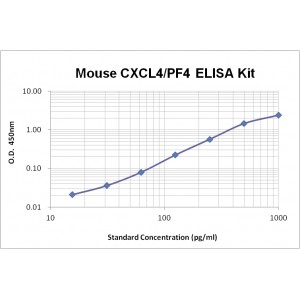More info
Assay Range | 15.6-1,000 pg/mL |
Sensitivity | 1.0 pg/mL |
Size | 96T |
Storage | Store at 2 - 8ºC. Keep reconstituted standard and detection Ab at -20 ºC |
Assay Principle | Sandwich ELISA |
Sample Volume | 100 µL final volume, dilution factor varies on samples |
Detection Method | Chromogenic |
Kit Components
1. Recombinant Mouse CXCL4 standard: 2 vials
2. One 96-well plate coated with anti-Mouse CXCL4 Ab
3. Sample diluent buffer: 12 mL - 1
4. Detection antibody: 130 µL, dilution 1:100
5. Streptavidin-HRP: 130 µL, dilution 1:100
6. Antibody diluent buffer: 12 mL x1
7. Streptavidin-HRP diluent buffer: 12 mL x1
8. TMB developing agent: 10 mL x1
9. Stop solution: 10 mL x1
10. Washing solution (20x): 25 mL x1
Background
CXCL4, also known as Platelet Factor 4 (PF4), is a member of the CXC chemokine family. CXCL4 exist as a tetramer of CXCL4 subunit that forms a ring of heparin-binding positive charges from sites at the C-terminal region of each monomer. Megakaryocytes synthesize CXCL4 and store it in platelet α-granules. Structurally, CXCL4 does not contain an ELR motif and lacks binding to nearly all chemokine receptors. It is reported that CXCL4 elicits its signaling transduction by binding to glycosaminoglycan chains, particularly chondroitin sulfates. CXCL4 has been shown multiple functions in regulating coagulation. For instance, it binds and regulates thrombin/thrombomodulin complexes. It also enhances production of activated Protein C, which limits the coagulation cascade. CXCL4 binds and influences the enzymatic activity of coagulation factor Xa. It binds fibrin and affects clot structure. In addition, CXCL4 can act as a pro-inflammatory factor. It has been shown to be involved in monocyte survival, macrophage differentiation, TNF-α induction, and induction of endothelial cell apoptosis.


